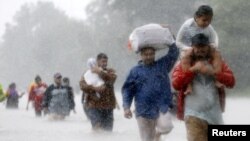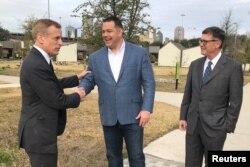Robert Kaplan is the head of the Federal Reserve Bank of Dallas. It is one of 12 regional Reserve Banks that make up the U.S. Federal Reserve System, America’s central bank.
Kaplan met recently with a group of business owners and community leaders on Texas’s Gulf Coast. He faced more questions on one subject than any other. It was not interest rates or economic conditions in the United States.
The business leaders and local leaders wanted information about climate change.
Texas has suffered disastrous flooding and billions of dollars in related losses in recent years. Now, “it’s hard to meet with a business person or a city or a community leader in this state” who doesn’t have questions on climate change, Kaplan said. He is a former investment banker and one of 17 Federal Reserve policymakers.
In other states, people also are asking questions about climate change. There have been large fires in Northern California and bad storms along the coasts of Florida, South Carolina and North Carolina. So, the Fed’s regional banks are thinking about how the changing conditions will affect U.S. businesses, and the country’s $17 trillion banking system.
That is in conflict with the position of much of the U.S. government. President Donald Trump and his administration have rejected the science on climate change.
But the Federal Reserve is not like other government agencies. It has more independence from the White House.
The Fed’s Washington-based Board of Governors is part of the federal government. Its governors serve 14-year terms, longer than any U.S. president. The system’s 12 regional Fed banks are privately owned by local financial organizations.
That independence gives the Fed a loud voice in local communities.
“There is a lot of information and statements being thrown around” about climate change, said Elizabeth Chu Richter, a businesswoman. But “the Fed is objective,” she added. “They work off the data they collect.”
Chu Richter attended the Texas gathering with Kaplan last month.
New interest
Until recently, climate change research has not been a major issue at the Fed.
Catherine Wolfram is with the National Bureau of Economic Research’s Environment and Energy Economics Program. She recalls giving a talk at the Fed’s headquarters in Washington in 2017.
“There weren’t more than six other people who were even vaguely interested in the topic,” she said.
Two years later, the Federal Reserve Bank of San Francisco is holding a conference on the economics of climate change. There are no more seats available for the November 8 meeting.
In the past, the San Francisco Fed has explored how to give banks more motivation to deal with climate change. Last year, researchers at the Richmond Fed found that hotter temperatures could slow economic growth.
In January, the four living former Federal Reserve chiefs signed a letter pushing for a carbon tax. Such a tax would increase the cost of releasing pollutants. They said climate change was “a serious problem calling for immediate national action.”
The U.S. central bank is taking climate change seriously, but it remains far behind other countries, like the Bank of England and the Dutch central bank. They have called for action to stop the possibly disastrous effects of climate change on economic growth and financial security.
Most G20 central banks have signed up to an information-sharing group called the Network for Greening the Financial System. The International Monetary Fund also joined recently. Its majority shareholder is the United States.
The Fed has yet to join. Some say it is because of the Trump administration’s belief that climate change is not real.
Adam Tooze teaches economic history at Columbia University in New York. He says the Fed does not want to get into an argument with the Trump administration.
I’m Susan Shand.
The Reuters News Agency reported this story. Susan Shand adapted it for VOA Learning English. George Grow was the editor.
Write to us in the Comments Section or on our Facebook page.
________________________________________________________________
Words in This Story
vaguely – adj. not clearly seen or understood
topic – n. an issue or subject
carbon – n. a chemical element that forms diamonds and coal and that is found in petroleum and in all living plants and animals
stability – n. the quality or state of something that is not easily changed or likely to change
G20 – adj. short for the Group of 20, an international grouping of the world’s largest industrial countries and developing economies
shareholder – n. someone who owns shares in a company or business
regional – adj. involving or affecting an area
data – n. factual information









